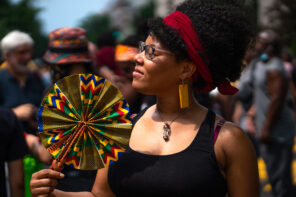The order by Alabama Supreme Court Justice Roy Moore that judges stop issuing marriage licenses to gay couples re-opens a messy legal case. But it shouldn’t. This is a discussion that should be taking place within and among faith communities—not my side vs. your side but real digging into the theology of gay relations. The key question is: are we treating biblical passages about homosexuality differently from the way we treat other passages?
Far fewer court battles would erupt if those bringing the suits first worked together on the religious material. In short, get the issue out of the courts and back into religious discourse, where it belongs. That’s one thing the separation of church and state is for: to keep preference for any one religion out of the state (and secular law) and to keep the state out of religion. This is a religious discussion we’re having, so let’s have it.
Taking seriously the obligation to follow biblical principles, can we deny civil marriage to gay couples when we do not deny it to other violators of biblical law? I do not mean those who abrogate biblical dietary or other ritual laws, from which Christians, since Paul, have been exempt. I mean those who steal (including white collar crime), covet, or commit heterosexual adultery. These are all prohibited in nothing less than the Ten Commandments, by which Christians are bound.
If homosexuality is grounds for marriage license refusal, should these violations not be? We have no law barring murderers from marrying but we bar gay people?
What about those who violate biblical injunctions to aid the needy, stranger, and enemy, among the most important of biblical mandates? Homosexuality is mentioned a few times in the First Testament and not at all by Jesus Christ and the Gospel texts. Jesus often had a far better sense of priorities than his (practical, evangelizing) followers. Sigh. Biblical injunctions to help the needy number roughly two thousand, yet we do not ban the marriages of those who ignore them. I did not hear that Justice Moore—or Kim Davis—checks each marriage applicant’s record on these obligations and refuses marriage to transgressors.
It seems our treatment of homosexuality indeed differs from our treatment of other biblical matters.
Given that the Bible is not a string of disconnected orders but a book of theological and ethical principles, do we follow those ethics in refusing to marry couples who want in to the biblical obligations of fidelity and family responsibility—to Thanksgiving dinners, in-laws, church bake sales, and orthodonture bills?
We have no laws barring adulterers from re-marrying. What are the ethics of barring people who wish to be faithful?
Before thousands of dollars are spent on more legal fees, these matters need to be given a fresh look where we are open about our ethics and about what motivates us. Convictions and feelings are important but they are not biblical authority.
So, let’s look at that biblical authority and the passages most frequently cited against homosexuality, Leviticus 18:22 and 20:13. They call male homosexual relations toevah, which has unfortunately been mistranslated as “abomination”—which sounds truly disgusting.
But toevah, as Jay Michaelson notes in his excellent chronicle of the word, means something like “out-of-bounds”—things we don’t do but others might. For instance, Israelite sacrifices are toevah for the Egyptians (Exodus 8:22)—Egyptians don’t do them, but we Israelites do. Eating with Israelites is also toevah for Egyptians (Genesis 43:32) as are shepherds (Genesis 43:34), though the biblical fathers were in fact shepherds. That Egyptians find eating with Israelites toevah is not a judgement about Israelite dining per se but about its relative status among different groups.
In short, toevah is a sociological term about cultural practices of the day. The most important of these in the Pentateuch is idolatrous ritual practice. These are out-of-bounds for Israelites though clearly not for the peoples who believe in them. In later biblical books, the meaning expands somewhat to other things associated with alien groups (the prayers of the wicked, or usury, which is biblically prohibited). In Ezekiel, toevah is a castigation of idolatry and znut and zimah or “whoring after someone.” The terms znut and zimah in Ezekiel are metaphors for betraying one’s God—whoring after false gods. The thing that’s toevah is idolatry, not a sexual practice (Ezekiel 16:22, 16:36, 16:58, 23:26, 43:8).
In the biblical context, male homosexuality as it existed then was out-of-bounds for Israelites. But the Bible has no concept or discussion of homosexuality within loving, loyal, enduring relationships. The Bible does speak of marriage as the union of a man and a woman, but the concept of homosexual marriage was not available to Jesus or anyone else of the era. One cannot be sure what he would say about it—especially as he never mentioned homosexuality, despite the fact that it (unlike gay marriage) did exist.
The ethics and exegesis of this need working out. It’s the religious—not the legal—discussion that’s lacking. The Bible cannot be applied scattershot. So the question remains: do we honor biblical principles and authority when we tell people who wish to uphold the sanctity of marriage that they cannot?




